Rupert Everett: ‘If Boris makes a comeback, I’m leaving Britain’
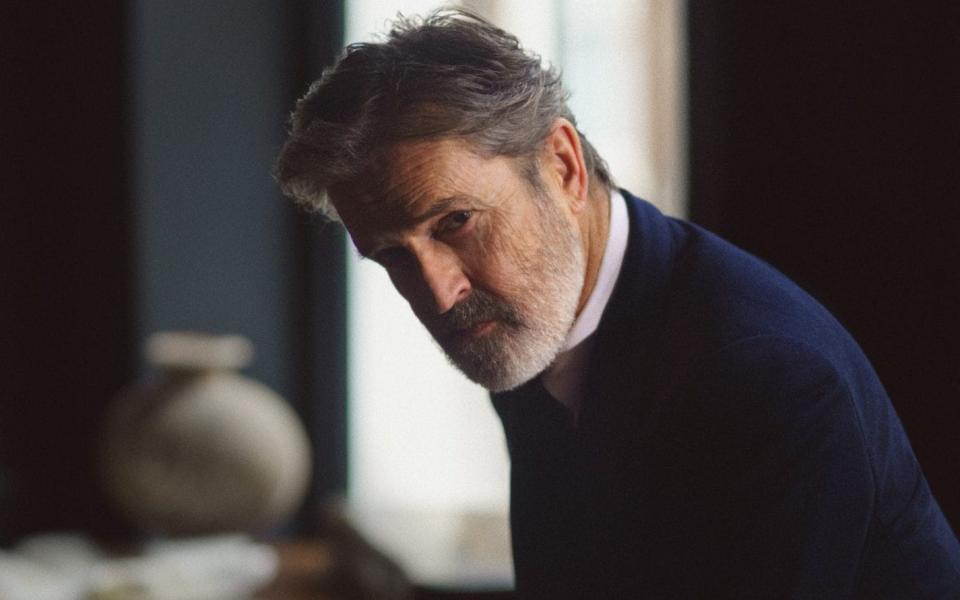
‘Shall we go to bed?’
I thought Rupert Everett would never ask. Then again, I only arrived at his Bloomsbury home 10 minutes ago, and the 63-year-old actor and writer isn’t so much inviting me into his magnificent carved mahogany four-poster (although that’s where I later end up) as expressing a ‘need to lie down’.
Everett has a cold. ‘It’s not Covid,’ he assures me as we move from the sitting room – hung with an eclectic mix of tapestries, Baroque art, Derek Jarman and contemporary photography – through to the study where Enrique, a Brazilian accountant and his partner of 15 years, is working, and upstairs to the bedroom. ‘But it does seem to be lingering.’ That, along with a recent stint of filming in Naples, where he has been shooting a new production based on Romeo and Juliet, has left him ‘a little knackered’.
He doesn’t look knackered. In fact, he appears exactly the same as he was the last time I saw him in person, a decade ago. He is as slender as ever, and his face has retained the fierce beauty that had him described as ‘the Matt Dillon of the English posh-boy brat pack’ in the 1980s when he first shot to fame, before going on to star in The Madness of King George in 1995, and the global hit My Best Friend’s Wedding in 1997.

Today, as he lies back on the bed in his black-painted bedroom (‘a very calming colour’), and I sit, therapist-like, on a chair beside him, Everett’s features are hidden beneath a full Cossack-style salt-and-pepper beard.
He’s given up on the ‘vampire facials’ (in which your own blood platelets are injected into your face to stimulate new cell growth), and he’s not dyeing his hair or having filler in his ‘dribble drains’ (the two lines leading down from the mouth), as before. ‘Because there’s a point where either you go for the full…’ he mimes the slice of the surgeon’s knife across his neck, ‘and I’m terrified of a five-hour anaesthetic – or you own it.
‘Anyway,’ he adds perkily, ‘the parts I’d like to be playing now are 80- and 90-year-olds: King Lear-ish parts. I’m really enjoying pretending to be more decrepit than I am.’
He does decrepit extremely well. I’d thought as much when I saw him in last year’s My Policeman, the Michael Grandage romantic drama starring Harry Styles, in which Everett played a cantankerous stroke-survivor. His forthcoming role as a stout old talent agent in Sky’s excellent new series, Funny Woman, only confirms it. To the point that I wonder whether, like the gorgeous actresses who scoop up Oscars after hiding their looks behind fat suits and prosthetics, Everett may only now be reaching his professional peak.
‘Oh, I’d adore to win an Oscar,’ he says. ‘I care about all that stuff. I’d like to be a lord, a sir, have the Oscar: all of it.’
To play agent Brian, Everett spent hours in the make-up chair. ‘They had this amazing fat suit for me, and the teeth! There’s this great company called Fangs FX: they can change the whole of the shape of your mouth with their teeth. Ideally, I’d like new teeth with every job.’
Set in 1960s London, Funny Woman – based on a Nick Hornby novel – tells the story of Barbara Parker (Gemma Arterton), a Blackpool beauty queen who, with the help of her agent, defies all sexist odds to become a comedy superstar. Written by Morwenna Banks and directed by ‘the brilliant’ Ol Parker, the series has the same feelgood, quintessentially British appeal as David Leland’s 1987 hit, Wish You Were Here.
Everett believes the message of the series is particularly important today, ‘When we are living in such a neo-puritan world where the whole rough and tumble of the post-sexual revolution ’60s and ’70s is very misunderstood. It’s interesting how much we were prepared to deal with things that people now can’t deal with. In a way, people are much more vulnerable today – for whatever reason.’
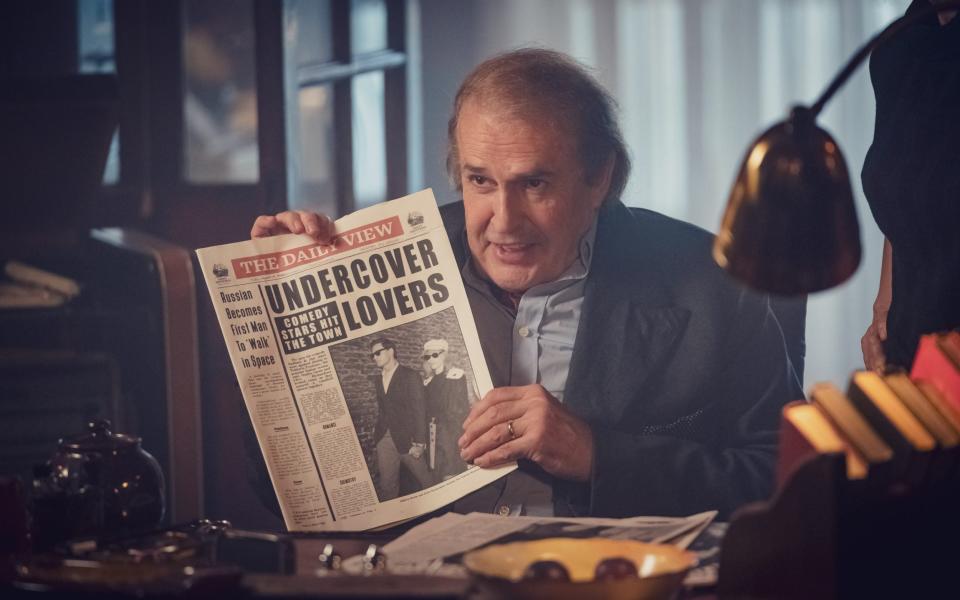
Arterton’s character ‘is absolutely not a victim of anything or anyone,’ he explains, wolfing down two bananas in quick succession. ‘Instead, she is constantly pushing.’ Like Arterton herself, whom Everett describes as ‘a real trooper’, Barbara Parker ‘is a blade of grass coming up through a concrete slab, which is what life is, in a way’.
Viewers might well shake their heads in astonishment at the series of indignities and affronts young Barbara faces, at a time when actresses were only ever seen as decorative foils to their leading men and routinely preyed upon by industry top dogs. The reckoning of MeToo was long overdue, says Everett. ‘For years men have been very entitled in the way they think of and behave towards women, and I think it’s great that it has been addressed.
‘Of course, now every man is just terrified of women, so that has dealt with that.’ He laughs, then, aware of how that might sound, adds: ‘Still, some women have been terrified of men forever, so…’
Part of Everett’s brand has always been his outspokenness and, more recently, a defiance of the woke brigade. His first memoir, Red Carpets and Other Banana Skins, was an international bestseller when it was published in 2006, with the critics comparing his razor-sharp style and artful celebrity take-downs to the writings of Evelyn Waugh, David Niven and even Lord Byron. The two follow-ups were equally well-received, and he is working on another volume.
Over the past few years, however, an uncharacteristic restraint seems to have crept into Everett’s interviews, and it’s easy to understand why. In our era of cancel culture, all it takes is a single sentence and you’ll never work again. Which is not to say that the actor is going to hold back on the issues du jour…
We meet on the day that Prince Harry’s autobiography is published, and dominating front pages. As a royalist who adored the Queen – and was horrified to hear that his 2015 film, A Royal Night Out, in which he played George VI, had upset her – he has strong views of the whole sorry mess, and in particular, the couple’s preceding Netflix documentary. ‘I have to say, Meghan’s a better actress than I thought she was,’ he says.
But as for the book, ‘It’s made me change my view. I was angry before, and now I just feel very sad – sad for Harry. I felt so sympathetic towards him for years and I still do now.’
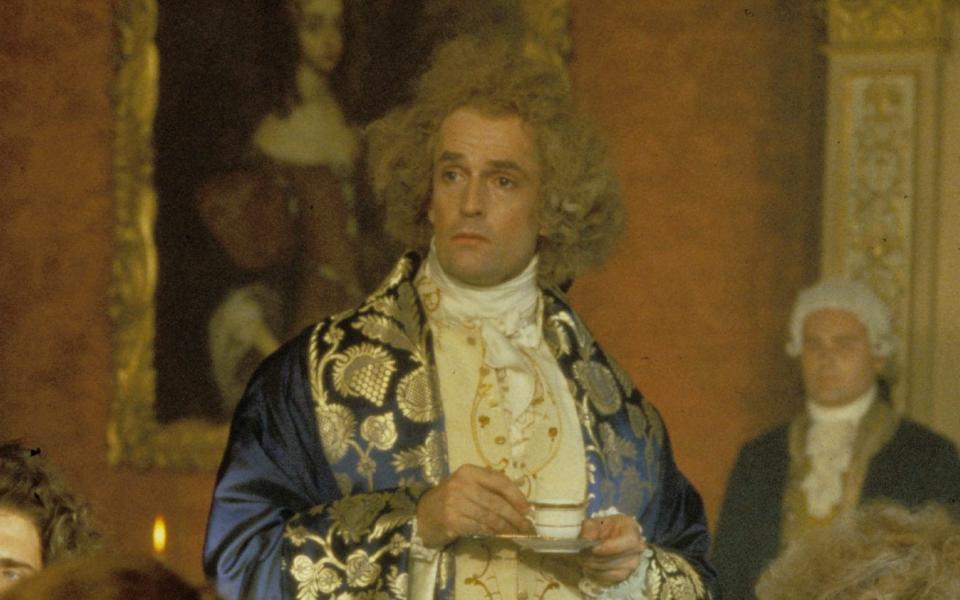
He nods vigorously when I express surprise. ‘Honestly! As someone who has put his foot in it quite a bit, I feel particularly bad for him about the Taliban thing. That changed everything and loses him the one group that still loved him.
‘I think he’s deranged. Although, of course, nobody is giving him good advice.’ As for what will happen to the Sussexes now, all Everett will say is: ‘Really, it’s been the most disastrous bumping of privates since Cleopatra and Caesar.’
His dark eyes twinkling, he adds: ‘By the way, I know who the woman he lost his virginity to is. And it wasn’t behind a pub. And it wasn’t in this country.’
So Harry deliberately set the whole scene elsewhere? Everett gives me a Cheshire-cat smile. Who is she? ‘I’m just putting it out there that I know.’ Because he knows the woman? ‘Yeah.’

Certainly Everett has never been one to toe the line. Perhaps because he’s clever enough to spot the nuances.
He feels ‘very strongly’, for example, that straight actors should be allowed to play gay roles. ‘Acting is about appropriation!’ he exclaims, pulled upright by the force of his conviction. ‘It can’t be anything else, and it’s a disaster if only gay actors can play gay roles. That [narrative] is insane!
‘What’s important is gay actors being able to play straight roles, just as I don’t imagine trans actors would only want to be confined to playing trans roles. If I was trans, I would want to play Desdemona.’
This all started with Russell T Davies, he goes on, ‘after he made the wonderful [Channel 4 drama series] It’s a Sin and said that only gay people had the tools to play gay parts. Then Tom Hanks took up that cry and said he felt bad about Philadelphia, in which he played a gay man living with HIV.
‘But I don’t feel bad about Philadelphia, and I certainly don’t feel bad about Michael Douglas and Matt Damon in [Liberace biopic] Behind the Candelabra. I was very moved by the way they tackled those two roles.’
However, he’ll admit to being ‘very frustrated by Colin Firth in A Single Man’ [in which Firth played a gay college professor]. ‘In fact, when I watched it I thought: “Well, that’s my career down the drain,” because it could have been my part. And I regret that it doesn’t work the other way, because then I could have got to play Mr Darcy, and I would have loved that.’
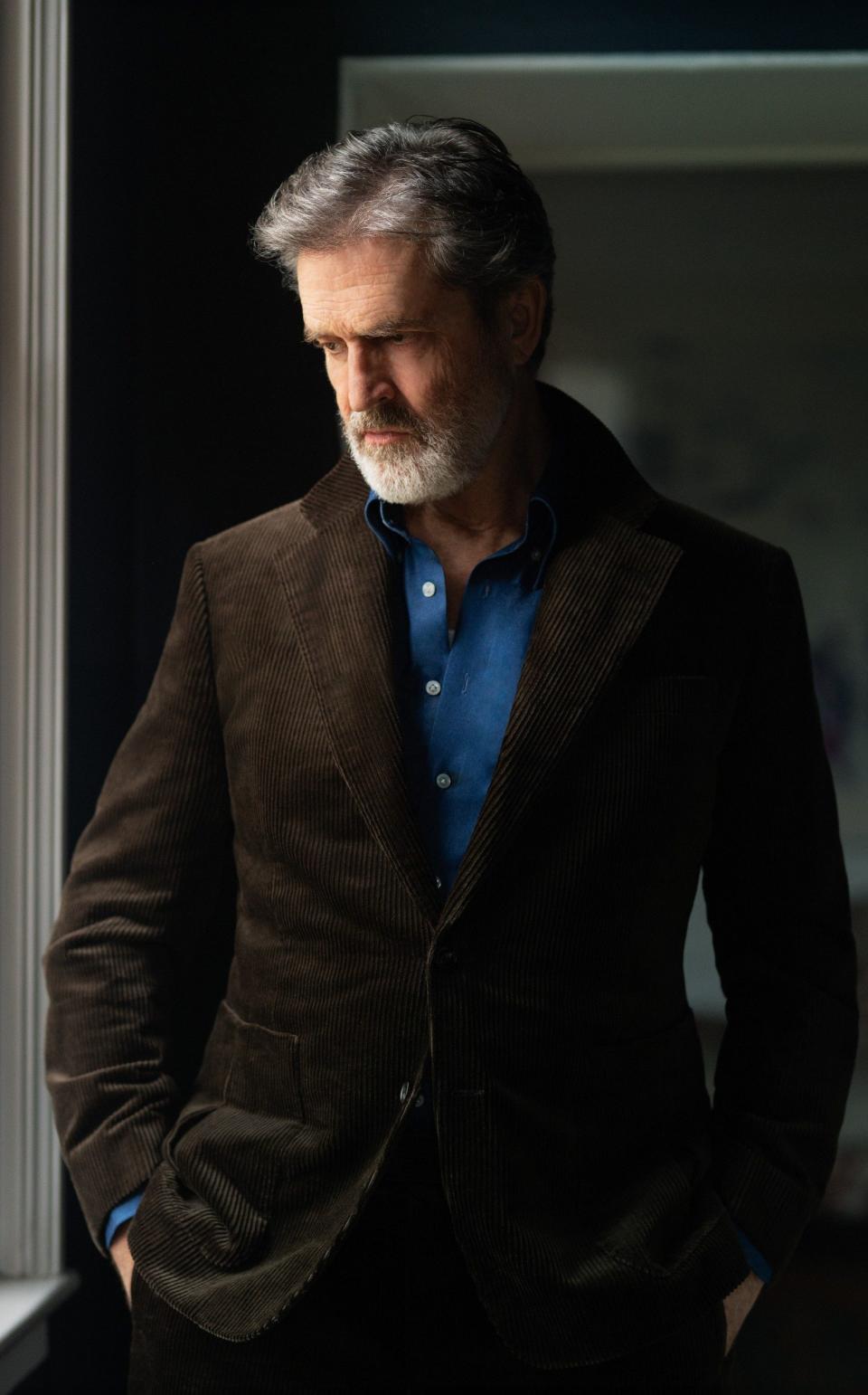
Everett also ‘felt very upset’ by Tom Hollander landing the role of a gay conman in the second season of hit HBO series The White Lotus. ‘I would have been brilliant in that role. And he was very good too, but his whole thing is about being straight, and I think I would have done a better job.’
We break off for a moment to discuss ‘that scene’ featuring Hollander – deemed by the Twitterati to be ‘one of the most explicit gay sex scenes ever depicted on TV’. ‘I actually thought the gay scene in the first series was far more shocking.’ He chuckles knowingly. ‘Or for most people, anyway. That was the first time I’d seen a hard c—k on telly. Which is a real first, and now we’re seeing that everywhere…’
In recent years his industry has made great strides in many areas, he believes. ‘Just recently I got offered a very good straight part in a TV series, which would never have happened when I was younger.’ But other ‘advances’ baffle him. The phenomenon of ‘intimacy directors’, for example – there to safeguard actors during sex scenes. ‘On one job, the intimacy director was shouting through a megaphone: “OK, you go down there!”’ He chuckles. ‘Maybe I’m too old to understand, because although I never liked snogging because of the sound effects,’ he makes slurping noises, ‘I always found sex scenes fun.’
He recalls one with Sharon Stone in the 2004 Cold War drama A Different Loyalty. ‘You’re spending hours naked in between someone’s open legs, waiting and chatting as they’re bringing tape measures in and doing the lighting.’ He shrugs. ‘It’s just a fascinating side of the job. I remember Sharon telling this amazing story. She said: “You know what I tell a guy when he’s f—king me? I tell him to look me in the eye and then go in and out real slow.” So yes, I really enjoyed all those scenes.’
The youngest son of an army major who served in the Duke of Edinburgh’s Wiltshire regiment, Everett was born in Norfolk and raised as a Catholic, taught by Benedictine monks at Ampleforth, where he gleefully took on the girls’ parts in school plays but was otherwise uninspired. It was only when he left for London at 15 that ‘everything exploded’.
Everett repeatedly came out to his mother as a youngster – her response was consistently, ‘I think you’ll find you’re not’ – and ‘at school I used to dress up as a girl at the weekends, and go to the rugby matches pretending to be someone’s sister.’
And if puberty-blocking drugs were available back then?
‘I would definitely have taken them,’ he says. Although he did subsequently have the occasional girlfriend (the most famous being Paula Yates, with whom he had a six-year affair whilst she was married to Bob Geldof), moving to London let him embrace his sexuality. He settled in ‘a very gay area’, partied every night and took pretty much every drug available. Then, at 22, he got his break playing a gay schoolboy in Another Country at Greenwich Theatre. It transferred to the West End, with Everett opposite Kenneth Branagh, before becoming a film.
Success, when it came, was like the best drug. He became close to Madonna, who he appeared alongside in rom com The Next Best Thing (2000) – but their friendship palled after Everett described her in his memoir as ‘an old whiny barmaid’.
When I suggest that perhaps part of him always wanted to be an outlier where Hollywood was concerned, Everett is adamant that wasn’t the case. ‘I was desperate to be part of all that.’ He frowns. ‘But I always felt so ill at ease, so tense.’

Remembering driving down Sunset Boulevard on his first trip to Hollywood to promote Another Country, his face lights up. ‘This car drew up and a man shouted out, “I loved you in that movie!”’ It was Sean Penn. Everett was ‘so excited – and upwardly mobile’ that he immediately rang Penn’s agent and the pair ended up at a party at Warren Beatty’s house that night. ‘It was full of these ballsy young actors, and I just didn’t know how to be like them.’
Yet I always think of him as a show-off? ‘I am a show off!’ he agrees. ‘But I was a Jekyll-and-Hyde character. I could be funny but also very shy. I couldn’t get it right, somehow. But oh, I wanted it so much. And I loved success,’ he adds wistfully. ‘People are always offering you work and you can afford to be magnanimous with everybody. You’re living on a cloud.’
My Best Friend’s Wedding, in which he played Julia Roberts’ droll gay best friend, took that success to another level. And yet Everett has always insisted that being open about his sexuality all but killed his Hollywood career. It’s true that Everett hasn’t been offered the leads he arguably deserves, though has starred in big-budget films – such as the 2007 St Trinian’s movie – and garnered critical acclaim for his 2018 directorial debut about the final days of Oscar Wilde, The Happy Prince.

‘I spent years after My Best Friend’s Wedding sitting around in Hollywood trying to get jobs.’ He shrugs. ‘But showbusiness is not for sissies. You have to have a hard shell, because you go through a thousand little deaths all the time.’ He pauses. ‘At times I’ve felt like a ghost. People walk straight through you. And you still have to get down on all fours: everyone in showbusiness does. I’ll be doing it right up until I have a heart attack on the bus, aged 85, on the way to the National Theatre. Because it’s very rare that your body of work is remembered, only what you did last week.’
He is hitting his stride, and segues into more opinions: the problem with universities, the rise of cancel culture. ‘The solution to all this country’s problems is education,’ he says with aplomb. ‘It’s a mess. We had people like Jeremy Corbyn telling us we should abolish Eton, when I think Eton should be put in charge of primary and secondary education! It should all be brought up to an Eton standard.’
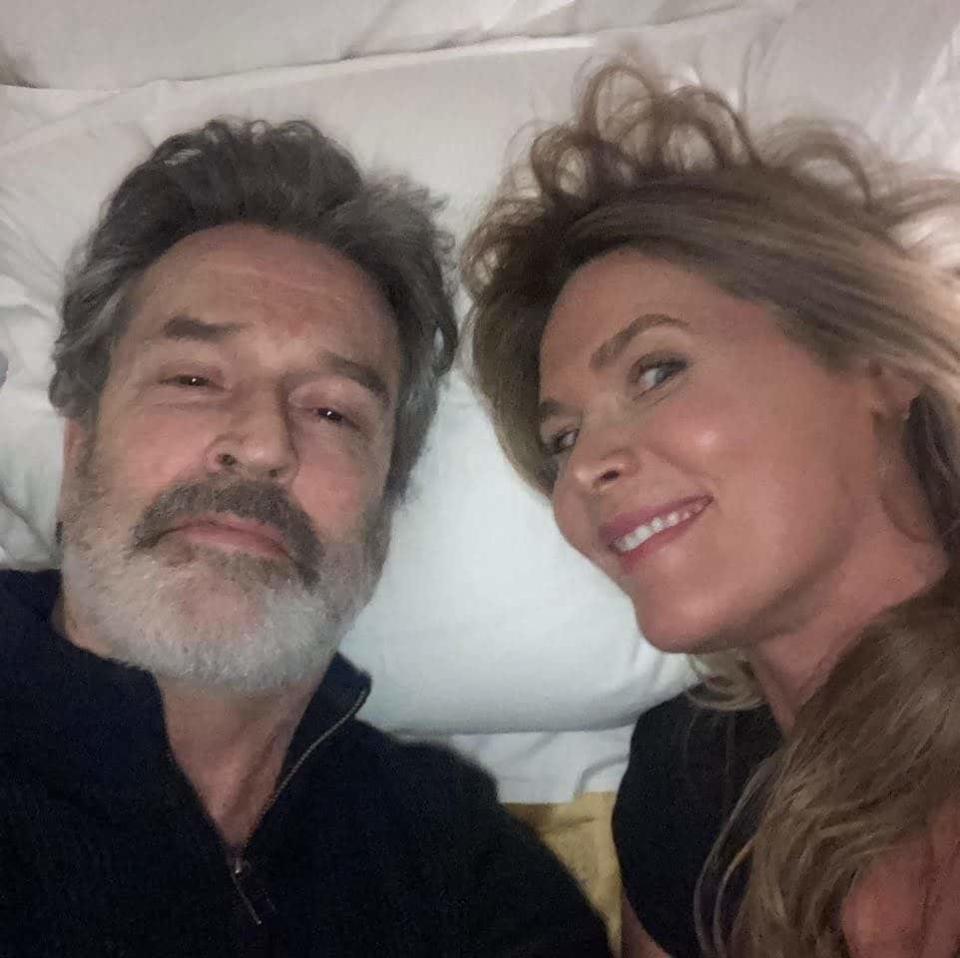
He swings his legs off the bed. ‘I also think the university debate is a red herring. The people who run British universities are slags – all they care about is their next pay cheque. They’ve allowed this extraordinary, untested ideology of woke and cancellation to run rife without even allowing it to be challenged. It’s outrageous. And anyway, nobody is going to get a job after university because they’re not studying things that will be of any use. There should be apprenticeships after school, and primary and secondary education should be of a 200 per cent higher standard. Then all our problems would resolve themselves.’
Given Everett seems to have fixed the country in a single monologue, perhaps he should throw his hat in the ring and save the Tories? He lies back again with a groan of horror. ‘I could never. But I am relieved that – whether you like them or not – we do now at least have two proper, sensible people leading the two main parties. Although if Boris Johnson, that pantomime dame, gets back in power I will leave the country.’
This, I hazard, would be a shame given how content he seems. He and Enrique spend most of their time at their Wiltshire home. ‘And honestly, I’m a bit of a recluse. I’m not a party person any more.’ He sneezes loudly. ‘I’m not sober, certainly not. But I don’t like drugs any more. At this age you start to worry about your brain, you know, and I love its freshness now. I’d much rather use my faculties to notice and listen and think.’
Enrique is waiting for our interview to finish so that they can take Pluto, their black Lab, for a walk, and I ask whether Everett might one day consider marrying. ‘I’ve always thought that marriage is a dangerous state,’ he begins, ‘because you take a Polaroid of that day and then you hold the rest of your relationship up against it forever. On the other hand, I would like to be married, just me and Enrique and a priest in my local church – but [being gay] you can’t, of course.’
It has never crossed his mind to have children. ‘I always thought, “Well, at least I’m not one of those people taking the population to eight billion and one.” People like me should be given some kind of pension for not having kids.’
Pluto’s growing impatient, but before I let them go, we decide to take a series of selfies in bed. As we angle our faces this way and that, the Labrador shoots us a look. I’m pretty sure it’s the canine equivalent of an eye-roll.
Funny Woman is available on Sky Max and Now from February 9

 Yahoo Movies
Yahoo Movies 